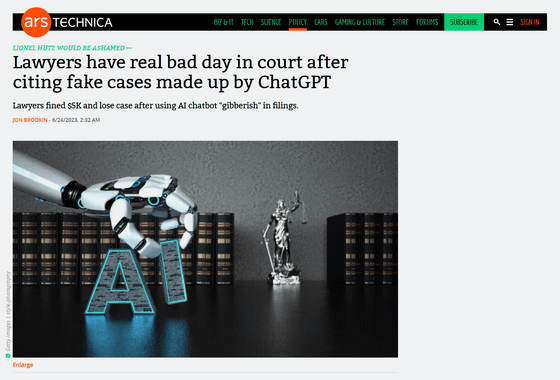A lawyer who adopted a non-existent precedent fabricated by ChatGPT was ordered to pay $5,000

In a case where a passenger's lawyer presented a 'non-existent past legal precedent output by ChatGPT' to sue the airline over an in-flight dispute, a federal judge ordered the lawyer to pay $5,000 and dismissed the original lawsuit against the airline.
Lawyers have real bad day in court after citing fake cases made up by ChatGPT | Ars Technica

Lawyers found $5,000 for using ChatGPT in brief | Fortune
Passenger Robert Mata filed a lawsuit against Avianca in 2022, alleging that he was injured in the knee by a food delivery cart while on a Colombian airline Avianca flight in August 2019.
The case was initially handled in New York state court, but was later transferred to the United States District Court for the Southern District of New York. Because the attorney who initially handled the case in state court, Stephen Schwartz of the firm Levidow, Levidow & Oberman, was not admitted to practice in federal court, the case was transferred to attorney Peter Loduca of the same firm.
Schwartz, who continued to prepare the documents after the transfer, used the text generation AI ChatGPT to create a written opinion that directly cited the 'non-existent past precedents' that ChatGPT had output. After receiving this opinion, Loduca submitted it to the court under his own name without examining the contents.
It turns out that a lawyer used ChatGPT to create an application that fabricated non-existent past cases - GIGAZINE

After seeing the opinion, which described a non-existent case, the court and the defendant's legal team pointed out that the contents may be false and requested that Loduca and his team re-examine the contents. In response to this request, Loduca and his team submitted a 'court opinion that detailed the precedents described in the opinion,' but this opinion was also found to be a false opinion output by ChatGPT.
Following this series of events, U.S. District Judge Kevin Castel reprimanded Schwartz and Loduca for 'inflicting harm on our client, wasting the court's time, and wasting the opposing parties' time and expenses' and ordered them to pay a combined $5,000.
Judge Castells found the briefs submitted by Loduca and others unconvincing and dismissed the suit in favor of Avianca. Judge Castells agreed with the defendants, who argued that the plaintiffs had brought the suit too late under the Montreal Convention, which provides for a two-year statute of limitations.

In a later affidavit, Schwartz testified that 'Until this incident, I had never used ChatGPT as a source for legal research and therefore did not know that its contents could be false,' and 'I heard about a new site called ChatGPT, which was like a super search engine, and I used it.' Meanwhile, Loduca claims that he 'believed that the documents prepared by Schwartz, who has been his colleague for 25 years, were reliable.'
In ordering the two lawyers to pay, Judge Castells said: 'This is a deterrent, not a penalty or compensation, because good lawyers usually receive adequate assistance from junior lawyers, law students and databases, and AI is the latest addition to this toolkit. 'However, all documents generated by AI must be checked for accuracy. The Court has confidence in the good faith of the respondents in their declarations of remorse.'
In addition to paying $5,000, Loduca and his team are being asked to submit reports to the six real judges who were cited in the fake case. Judge Castel said, 'If we force an apology, it won't be a sincere apology. It's up to the defendants to decide whether or not to apologize in the report,' emphasizing that the only obligation is to submit the report.

Related Posts:
in Software, Posted by log1p_kr






